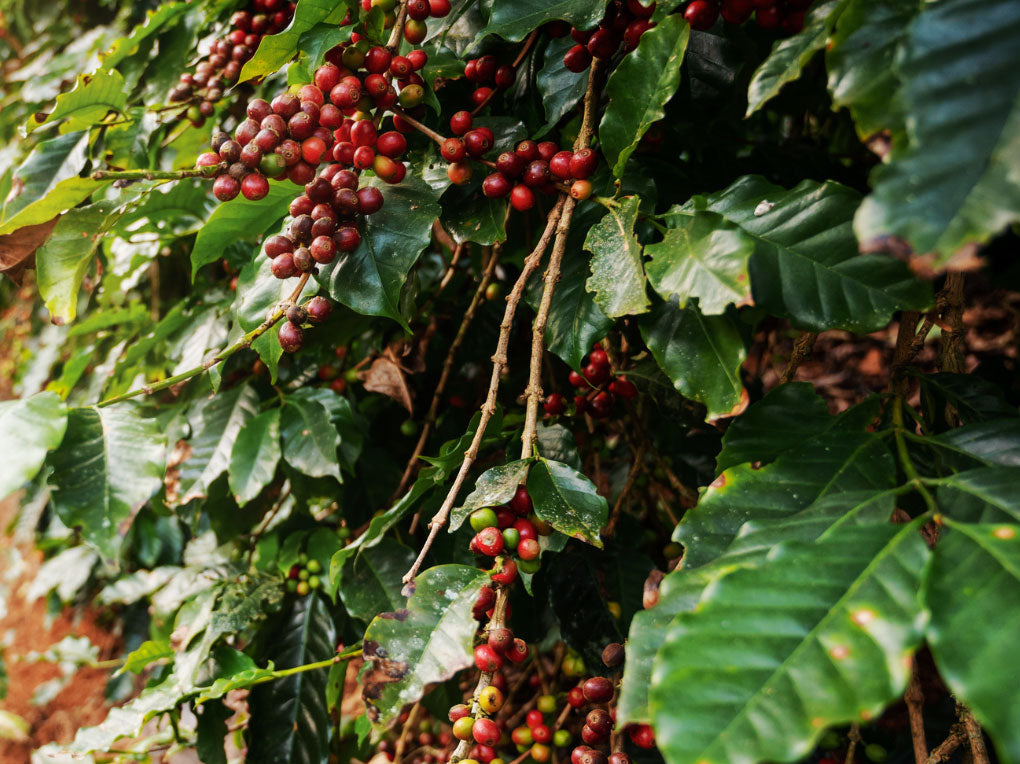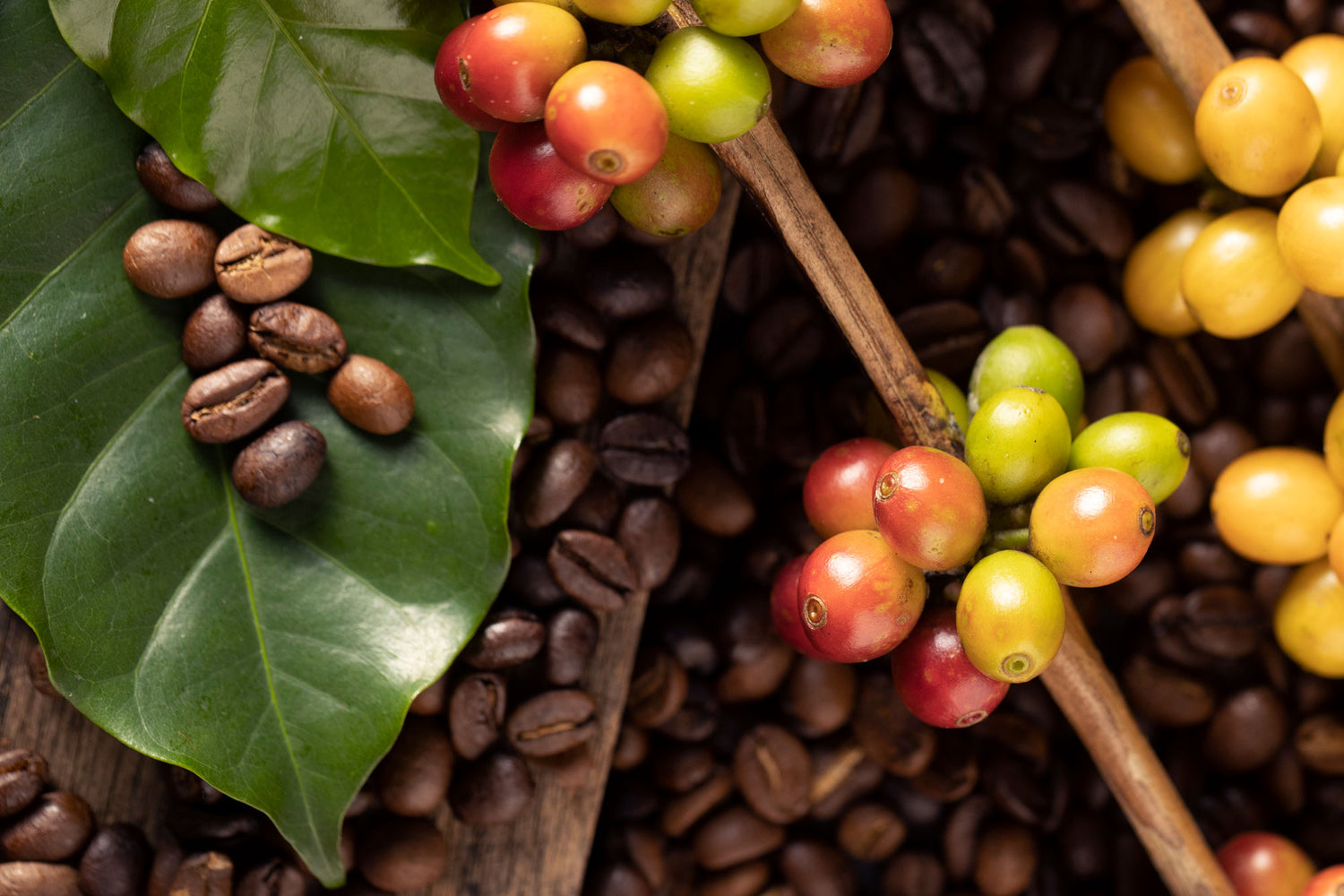
WELCOME TO THE REALM
Featured products
-
1LB Bengkulu Coffee Beans
Regular price $23.12 USDRegular priceUnit price / per -
1LB Yrgacheffe Coffee Beans
Regular price $25.46 USDRegular priceUnit price / per -
1LB Jaltenango Coffee Beans
Regular price $27.54 USDRegular priceUnit price / per -
1LB Espresso Blend Coffee Beans
Regular price $29.10 USDRegular priceUnit price / per

Providing premium coffee, tea, and adventures to fuel the divine wanderlust spirit of everyday heroes
The Realm
Visionary father and son team Carl and Andrew Hopple are passionate about adventure and exploration, and they know that the best days always start with an incredible cup of coffee. So, they are cultivating a community where coffee and adventure become an entwined, non-dualistic experience. The goal of the realm is to bring out the highest potential of each new member of this growing collective...but first, COFFEE.

Meet the Team!
They say teamwork makes the dream work, and here at The Realm, that couldn't be more true!
Tio Niko is well recognized by many in the coffee industry as a lord of his craft....finding the most delicious coffee beans in existence.
Baristas at The Realm are the lifeblood of our company. Their friendly, warm spirits are sure to leave you counting the hours until you get the chance to see them again!
-

Felix: The man, the myth, the legend
Greetings, friends and fellow adventurers!!
I’m Felix, resident of The Realm, and expert coffee bean roaster!
My spectacular dragon firepower provides our unique specialty beans a perfect roasting environment, and ultimately, creates the fuel we have come to rely on every day.
I'm so glad to be a part of this team of thrill seekers!
Care to join us on an adventure? Or take me with you?
Ask about how you can include me when you stop by the shop!!
-

Andrew: The Founder
I’m passionate about quality community and adventure. This company is the start of my dream to give everyone the experience of a lifetime. I love to entertain and serve others needs, and I want nothing more than to put a smile on the face of those around me. This small coffee stand is just the beginning of a big dream that I cant wait to share with the whole world. Fantasy, community, and adventure in a setting that you can be involved in.
Our Baristas
-

Adrienne: Muscle Queen
I have a love for the outdoors, and in my free time, I train in Brazilian Jiu-Jitsu. I love the smell of coffee and I'll always serve you with a smile!
-

Kayla: The Sweet Spirit
I'm a hardcore coffee gal! However, I like a good iced chai from time to time. My hobbies are doing musicals, plays, and being a part of choir. Can't wait to give you your daily caffeine.
-

Jaiden: Resident Gospel-Spreader
I've always had a passion for coffee and one of my biggest dreams is to have a Bible study coffee shop! My other hobbies include singing (I'm currently in college pursuing church music and worship leading) and going on spontaneous adventures with friends! Overall I love JESUS AND HE LOVES YOU!🤍
-

Emily: Team Mom
I love drinking coffee while reading a good book. I have a passion for teaching, I always have a song in my head, and I know smiles are contagious. Stop by and catch a smile from me as I make your quality beverage.

Jaltenango Organic
Farm: Ek Balam Productores de la Estrella del Jaguar
Processing: Fully Washed
Altitude: 800 to 1,700 meters above sea level
Owners: 1,054 smallholder producers
Town: La Fraylesca
Region: Sierra Madres, Chiapas
Country: Mexico
Average Farm Size: 4 hectares
Certification: Organic
Additional Information
About Chiapas
Chiapas is situated in the southern reaches of Mexico, with rich biodiversity and climbing altitudes – this region is known for its healthy soils and ideal climates for coffee production. As one of the five Mayan States in Mexico, Chiapas has a wealth of archaeological and cultural history. It is within this region that the Ek Balam was founded by a group of coffee producers, seeking to improve the many coffee-producing communities. Ek Balam was founded in 2019 on three main values: improving the quality of life for coffee producers, spreading coffee grown in this region to international markets, and conserving natural and historical resources.
The name Ek Balam honors the local Mayan history, translating to mean ‘the star jaguar,’ a reference to the famed cat living within the neighboring protected areas. Today, the organization comprises roughly 1,054 smallholder coffee producers, each growing coffee on 4.5 hectares of land. These producers reap the natural benefits of the El Triunfo Biosphere Reserve and the
Sierra Madre mountain range. Coffee is gathered from 6 municipalities in 35 communities with varying altitudes ranging from 800 to 1,700 meters above sea level. Varietals grown by the producers vary due to the different climates and elevations of each farm.
These producers have a rich coffee history, many of which inherited their coffee farms from previous generations. Most come from indigenous communities, still speaking native languages. Additionally, roughly 1/3 of these producers are female. In 2012, many of the Ek Balam producers were faced with the spread of Coffee Leaf Rust, which devastated the region. This led to the dissolution of many supporting coffee organizations in Chiapas, forcing producers to sell to local coyotes for low, unsustainable prices.
Thanks to the creation of Ek Balam shortly after, producers joined together and recovered what had been lost. The mission of the organization was to achieve economic, environmental, and social development and provide producers with access to international markets. Training was also provided to each producer to educate them about combating the spread of Coffee Leaf Rust, conserving soil and water, whilst also avoiding forest fires, a common threat in the region. The quality of the coffee grown by the producers has also significantly improved thanks to access to proper agricultural training and resources.
Not only has coffee production increased after the outbreak of Coffee Leaf Rust, but producers have also adopted different methods to diversify income including egg production and maintaining hives for honey. Producers are also encouraged and rewarded for protecting natural resources such as local watersheds. Thanks to this work, local fauna such as quetzals, and peacocks; and flora including pine groves, holm oaks, and evergreen forests, can thrive.
During the harvest, cherries are hand-picked and delivered to on-farm processing facilities within each farm. The cherries are floated and sorted to ensure quality is maintained. Next, the cherries are de-pulped and fermented in tanks of water to break down the exterior mucilage. Once complete, the coffee is spread evenly on cement patios to dry in the open sun. The coffee is regularly raked to prevent mold growth. As soon as the coffee reaches an ideal moisture content, it is transported to the dry mill to be hulled, cleaned, sorted, and graded before being bagged for export.
Ek Balam has helped producers by investing in proper infrastructure to transport coffee, and a dry mill facility to efficiently hull and bag the coffee. After just three years of activity, Ek Balam has significantly helped producers increase their income and improve agricultural practices, thus creating a future for coffee in Chiapas.

Ethiopia – Yrgacheffe
Grade 2 Washed - Idido Washing Station
Owner: Awoli Musa Salatu
Varietal: Heirloom
Processing: Washed
Altitude: 2,000 to 2,200 meters above sea level
Town: Idido
Region: Yirgacheffe, SNNP
Country: Ethiopia
Average Farm Size: Less than 1 hectare
Additional Information
About Yirgacheffe
Yirgacheffe is part of the Gedeo Zone, Southern Nations Nationality and People’s Region (SNNP), in southern Ethiopia, but its exquisite, washed coffees are so well-known that it has been subdivided into a micro-region. This steep, green area is fertile and high in elevation – much of the coffee grows at 2,000m and above.
At first glance, Yirgacheffe’s hills look thickly forested - but in fact, it is a heavily populated region, and the hills are dotted with many dwellings and villages growing what is known as ‘garden coffee’ (when families grow coffee on small plots of land surrounding their homes).
There are approximately 26 cooperatives in the region, representing some 43,794 farmers and around 62,004 hectares of garden coffee. The production is predominantly washed, although a smaller number of natural sundried coffees also come out of Yirgacheffe.
Around 85 percent of Ethiopians still live rurally and make a living from agriculture; each family usually lives in a modest home (often a single round mud hut) and farms their plot of land, where they grow both cash crops and food for their consumption. In Yirgacheffe, coffee is one of the main cash crops – covering from half a hectare to 1.5 hectares (the latter is considered significant). This is usually planted alongside a second cash crop – often a large-leafed tree used in making roofs for (and also shade provider for the coffee) known as 'false banana'. This looks like a banana tree but is not - instead, its thick stem is used to produce both a nutritious flour and a fermented paste that are staple ingredients (particularly across southern Ethiopia).
There is only one main harvest a year in Ethiopia - this usually takes place in November and December across all of the country's growing regions. After each producer contributing coffee to this lot harvests the cherries, they are delivered to the washing station where they are de-pulped and washed before being dispersed on raised beds. The coffee remains here for 15 - 20 days until the ideal moisture content is reached. The coffee is then hulled and prepared for export.
For many years, Ethiopian coffee, some of the best in the world, was for the most part untraceable. Starting in 2008, Ethiopia began the centralization of all coffee exports through the Ethiopia Commodity Exchange (ECX), where the coffees were ‘anonymized’, stripped of any information other than region, in the interest of the farmers, who were meant to receive top dollar for quality regardless of the ‘name’ of the washing station or farm. Coffees moving through the ECX were (still are) delivered to certified coffee labs, where they were cupped according to profile then graded and marked generically for export. This ‘equalizing’ measure certainly benefited some producers, but it had the negative impact of eliminating most roasters’ and importers’ ability to provide accurate information on the precise traceability of coffees. Even after the opening of the ‘second window’ (devised for direct sales of cooperative and certified coffee), as of the end of 2017 some 90 percent of coffees still moved through the ECX.
The end of March 2017 saw a massive overturning of this mandatory system. In a bill raised by the Ethiopian Coffee & Tea Development and Marketing Authority, Ethiopian coffee (even that sold through the ECX) can be marketed and sold with full traceability intact. The aim is to limit black market dealings, demand higher prices, and enable Ethiopian producers to receive more significant profit.
In a bit more detail, the new system allows any exporter with a valid license to sell directly to buyers without placing the coffee on the ECX first. There is a slight caveat – the parchment coffee will have to be sold within three days of arriving at the processing plant in Addis. If it is still unsold after three days (which is quite likely), it must be sold through the ECX: BUT with its traceability info intact rather than being deleted. Additionally, it is proposed that overseas companies will be able to plant and sell coffee, though this is still undetermined as of the 2018/19 harvest.
As of September 2019, The Ethiopian government and the European Union have officially announced the beginning of a €15 million five-year program, designed to boost the Ethiopian coffee sector. The program, named EU-Coffee Action for the Federal Democratic Republic of Ethiopia (EUCAFE), focuses on Ethiopia’s primary growing regions, namely, Oromia, Southern Nations Nationalities and Peoples (SSNPR), and Amhara. The project aims to tackle several objectives, including food security and health for vulnerable populations, improving farmer access to credit, technical assistance and inputs, marketing and strengthening premium market channels, climate change mitigation, and involving more women and youth.










